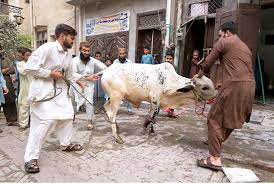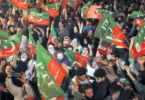LAHORE (APP): Butchers, whether trained or untrained, have made all arrangements to do a roaring business on Eidul Azha in the provincial metropolis.
Under sizzling heat, the expert butchers are not only in short supply, but they are also charging advance exorbitant amounts in the city. They are deemed as a rare commodity especially on the first day of Eidul Azha, ans they get innumerable orders despite demanding exorbitant charges for their services.
Experienced butchers are charging as high as Rs15,000 to Rs 20,000 for the first day of Eid for slaughtering a cow, as most of the wealthy people prefer sacrifice on the first day of Eid. “For a cow or buffalo, they are demanding Rs15,000-18,000, which is extremely a high rate and out-of-reach for a salaried class or a white-collar person,” Muneebur Rehman, a resident of Thokar Niaz Baig, told APP. He said experienced butchers were demanding Rs10,000 for slaughtering a sheep or a goat. The sacrificial animals are not cheap these days, and butchers too are expensive, Muneeb said.
He argue that those who can afford to buy a cow for Rs150,000 can easily afford spending another Rs18,000 to 20,000,” he said, adding that it had forced most people to book their butchers for the second day of Eid for the sake of affordability. In posh areas including Bahria Town, DHA, Lahore Cantt., the services of professional butchers had been hired on advance payments.
Khan Muhammad, a butcher from Mozang area here with his two sons Hamza and Usama, told APP that his service package for sacrificial animals includes slaughtering of animal, peeling of skin without any cut while chopping the meat into pieces. Khan said that they have set different rates for cow, goat and camel slaughtering, adding they are charging Rs 6,000-8,000 to slaughter a goat or sheep, Rs 12,000-18,000 for a bull or calf, and Rs 18,000-20,000 for a camel depending upon the locality. They are offering two options to the clients for slaughtering of animals – first is to slaughter the animal at the doorsteps of the client on higher rates and the second is that rate would be reduced if the customer brings the sacrificial animal at their shops.
Rauf Ahmad, another professional butcher from Ichhra, said that Eidul Azha provided them with an opportunity to earn handsome amount by slaughtering as many animals as they could. The trend of staying at shops had proved beneficial for most of butchers as it saved time, he added.
After smelling lucrative charges of slaughtering sacrificial animals, a large number of jobless youth, untrained and seasonal butchers had sprung into action, Rauf added. They have even set up makeshift booking stalls at important locations, with a view to engage the innocent people, they are offering 50 per cent less rates compared with the professional butchers.
More than 90 per cent non-professionals would be operating on Eid, Raziq Muhammad an elderly butcher from Anarkali, associated with the profession for the last 25 years, told APP. Besides, he said that many labourers, who were unable to find work due to Eid activities these days, had also engaged themselves temporarily in this profession, to earn their livelihood. He said he himself had hired a group of eight persons from his Jain Mandar and Anarkali area for slaughtering maximum number of animals. “Moreover, amid inflation this year, I am not seeing lucrative business as a lot of formations have entered into this business,” he added.
He said that the companies were offering various valuable services in their Eid package. Residents of narrow streets in downtown area, who could only buy a sacrificial animal, could get benefit from their slaughtering and packing services, Raziq added. The company butcher would slaughter the animal, cut it according to clients’ liking and get it packed, he explained. Though the new service had attracted a large number of Lahorites, it had also soared their prices including their eyebrows, he added.
Digitalization and online business have converted this ritual in to a commercial activity and it is feared that it will kill the spirit of Qurbani [sacrifice].
Amin Saqib, a subject specialist at higher secondary school Jallo, told APP that a new tradition has been started to save time, adding in the modern practice of Qurbani, people only get the meat cut in packing, which they store directly in their freezers, with no distribution among the poor or needy.
In the next few years, he lamented, it would become a regular un-Islamic fashion and thus, the true spirit and tradition of Qurbani would be faded.







